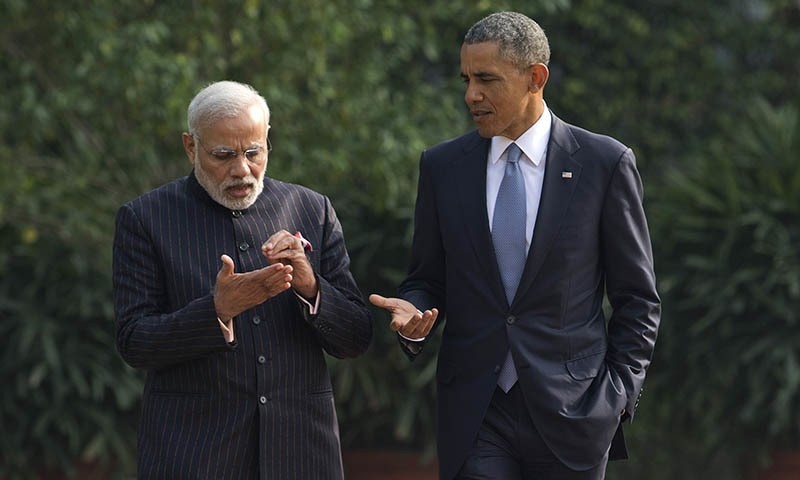
New Delhi, Jan 29 (IANS) The visit of US President Barack Obama to India not only resulted in both countries overcoming their six-year deadlock over the civil nuclear deal but also the emergence of a "strategic vision" document for closer cooperation in the Asia Pacific and India Ocean region in the backdrop of what is seen as an aggressively rising China, agreements that many feel may have resulted in India finally shedding its strategic inhibitions.
Lalit Mansingh, former foreign secretary and ambassador to the US, said the envisaged India-US cooperation in the Asia Pacific region signifies "a greater convergence between Mr. Modi’s Act East and Obama’s rebalance in Asia”. He said that both leaders were reported to have “discussed China extensively and the threat that China poses to both the countries".
“So the Act East and the rebalance in Asia will bring the two countries closer together and we are going to see much more of military exercises and more dialogue with countries like Japan, Australia and other countries in the region. Also we are seeing a greater convergence between America and Indian positions,” he said.
Hardeep Singh Puri, India’s former envoy to the UN who has joined the ruling BJP, said while he does “not read any attempt at containment” of China in the vision document, but what it and other outcomes from the Obama visit clearly signify that "India has shed its inhibitions" and wants to have qualitatively higher relations with the US.
"Even as it does so, it is following a multi-aligned approach. India will seek similar upgradation with China,” Puri told IANS.
“However, by virtue of the fact that US and India are the world’s two largest democracies and by virtue of the fact that there is an attempt at convergence in their positions, US-India relations will become more important; experience has also shown that when we have better relations with the US, our task of improving relations with China is also facilitated,” he added.
Rakesh Sood, former diplomat and formerly the prime minister’s special envoy for disarmament and non-proliferation, also said the vision document only spelt out “greater cooperation between the two countries in the Asia Pacific region” and not containment of China. However, he said, that judging from the Chinese reaction to Obama’s visit “they do not seem to be very happy”.
According to Mansingh, while the vision document does not mention China, but the very fact that it speaks of safeguarding maritime security and ensuring freedom of navigation and overflight, especially in the South China Sea region, indirectly refers to China.
Former foreign secretary Kanwal Sibal said "relatively speaking it would be rebalancing the power equation between China and the US, and they wanted to use India's weight, and India is using this publicly now".
He feels that with China "not having changed their core policies towards India", India is "sending a message to China that you play games with us in the Indian Ocean in our neighbourhood, then we will strengthen our hands vis-a-vis you by coming closer to the US more visibly".
Regarding the breakthrough agreement on the civil nuclear issue, Puri said it was arrived at “without need to revisit our domestic legislation. We have a categorical assurance from the prime minister on that. The contact group comprised members of a large number of government of India ministries. To suggest that senior officials would dilute our position in this respect is not tenable”.
“My assessment is that the prospects for commercial contracting to take place now are far better. In overall terms, I am cautiously optimistic,” Puri said.
Sibal feels the "breakthrough" in the nuclear talks is a signal that "at the government level they have had an understanding".
"The important thing is that we have shifted the whole argument away from government level to the commercial plane; so we have removed the strategic misunderstandings over this question successfully," Sibal told IANS.
According to Sibal, the understanding reached on the issue of the US wanting to track in perpetuity the fuel and equipment in its reactors, is significant. "This was much more difficult because it involved non-proliferation issues, though the detailed understanding is not clear."
Mansingh said though the two have resolved a problem that had a nuclear deal stuck for nearly six years, the inking of a commercial deal is not likely to come soon.
“We have to see whether the private companies like Westinghouse and GE will be able to find a solution to their problems; they have responded very cautiously saying they would like to see the fine print before they make any more comments,” Mansingh told IANS.
Sood said: “The breakthrough has to be welcomed, and the details of which will naturally come out in due course because other suppliers, both foreign and domestic, would also like to have similar assurances.”
The Supreme Court on Monday questioned Andhra Pradesh Chief Minister Chandrababu Naidu's claim of
Around 25 lakh people registered on the Co-Win portal on the first day of the second phase of Cor
PM Modi canceled rally of West Bengal, mentioned Corona
New Delhi: Terrible situation prevails across the country from Corona. Meanwhile, Prime Minister
The ongoing war between Russia and Ukraine does not seem to be stopping yet. Meanwhile, the Presi
New Delhi: While unlocking the Corona crisis, the Central Government has permitted to open school
Actress Ankita Lokhande was last seen in Salman Khan's popular reality show 'Bigg Boss 17'. Durin
Samsung Galaxy S21: This awesome Samsung phone got an Android security patch, know the full details
Samsung Galaxy S21 Series: Samsung Galaxy S21 series started receiving Android security patches i
Ensuring justice to be discussed in key Chinese sessions
Beijing, March 3 (IANS) Preventing wrongful convictions and ensuring judicial justice are likel
The second session of Pariksha Pe Charcha 2026 was broadcast today. This annual program can be wa
Tesla founder Elon Musk has regained the position of the world's richest person leaving behind Be